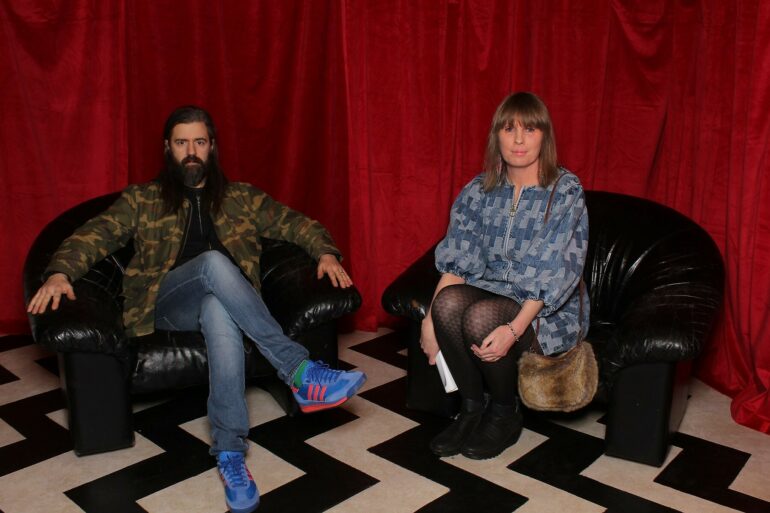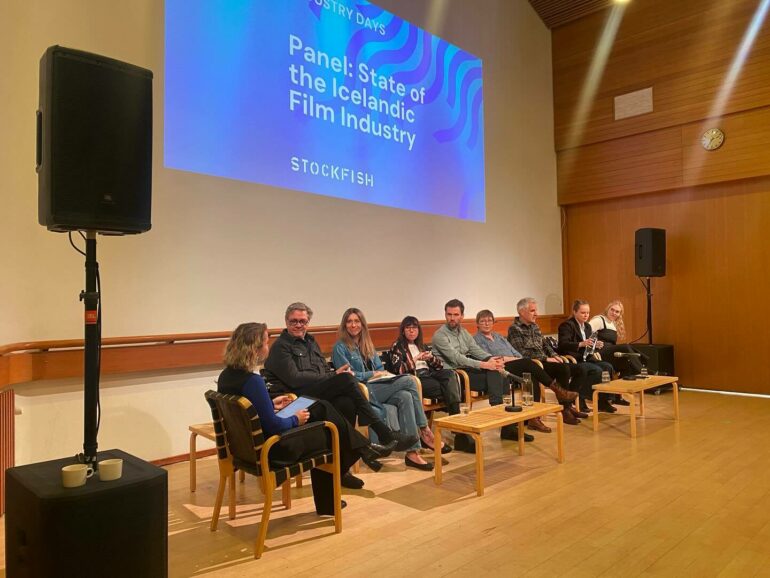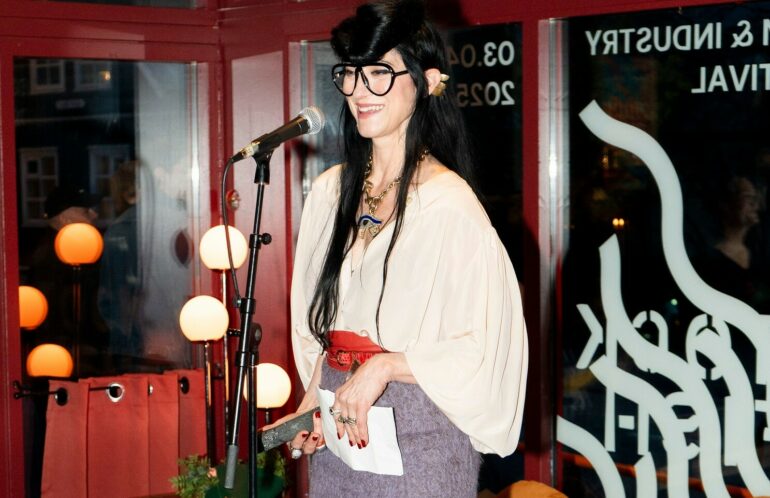Written by: Davide Abbatescianni
22.04.25
A sharpened mission, a youth-focused strategy, and full-house events marked the gathering’s latest edition, as it leaned into its role as a cultural incubator and policy platform.
It’s a wrap for the 2025 edition of Stockfish Film & Industry, which unspooled in Reykjavík from 3–13 April.
In her first year as Managing Director of the Stockfish Film & Industry Festival, Dögg Mósesdóttir has kept the festival’s core intact while bringing a sharper focus to its mission. Speaking to Nordisk Film & TV Fond, she elaborated on the changes she’s made, her ambitions for the industry, and how Stockfish is nurturing future generations of filmmakers and audiences.
“We kept the core of Stockfish, which is being an industry-owned festival that focuses on nurturing the grassroots,” Mósesdóttir told us. Central to that vision is facilitating a dialogue — not just within the film community through the Industry Days, but also between the industry and the audience via the broader film programme. “We decided to sharpen that focus even further and really celebrate filmmakers and artists who have been trailblazers, paving new ways for the cinematic language,” she said.
This mission guided the selection of this year’s honourees, which included David Lynch’s oeuvre, Italian-Canadian multidisciplinary artist Floria Sigismondi, Irish video artist Clare Langan, and Icelandic costume designer Dóra Einarsdóttir. “They’ve all paved the way for something completely different and opened up new paths for the cinematic language.”
This ethos also shaped the festival’s Work-in-Progress (WIP) selection, spanning fiction, creative documentary, and animation. “We had the same vision for the WIP as the whole festival — to support the brave filmmakers who dare to be different,” she noted. Priority was given to projects that would benefit the most from increased exposure and potential funding.
Industry engagement at Stockfish was robust this year. Mósesdóttir proudly shared that all events were full, with some even selling out. “Our three-day writers’ workshop, the David Lynch masterclass on surrealism and film, our music panel, Langan’s video art masterclass, and the pitching workshop were all at capacity,” she said. Collaborating closely with filmmakers’ associations, the team ensured the events were tailored to the industry’s real needs — a strategy that paid off, judging by the positive response.
When asked about the current state of the Icelandic film industry within the Nordic context, Mósesdóttir acknowledged both strengths and challenges. “Since there are no unions in the film industry in Iceland, the film associations are extremely important in protecting our rights,” she pointed out. A major milestone this year was a historic panel that brought together heads of these associations — a rare and much-needed moment of unity. “That’s maybe exactly what’s been missing — that we come together and talk, because we all want the same things: a stable and strong film fund and a strong and stable tax rebate system.”
With every new government, she added, the sector has to re-educate policymakers about how the film industry directly benefits public finances. “Every crown is paid back by the industry with profits for the government,” she stressed. Stockfish, in this sense, serves as a vital platform for dialogue between the industry and policymakers.
Curation was another area where Mósesdóttir’s vision came into focus. “We organised a very inspiring inclusion panel,” she recalled, highlighting the talk by Vigdís Jakobsdóttir, former director of the Reykjavík Arts Festival. Jakobsdóttir introduced the idea of the “Pac-Man effect”, a concept in which a deliberately incomplete circle leaves space for new perspectives and ideas. “Clare Langan also talked about this in her masterclass — she always leaves a little space for creativity in her projects,” Mósesdóttir added. The takeaway? “To always leave space for the unexpected.”
Stockfish’s key partners include the Icelandic Film Fund, the City of Reykjavík, national broadcaster RÚV, the filmmakers’ associations, and Nordisk Film & TV Fond. “We are always looking for new partners and collaborations,” she underscored.
Looking ahead, Mósesdóttir emphasised the importance of engaging younger generations. “We are very focused on youth and young people and the grassroots of filmmakers and cinema-goers,” she said. A policy of free entry has proven effective in attracting large numbers of young attendees. “It’s about media literacy and opening up the worldview of young people and broadening their taste in cinema.” The hope is that this young audience will grow alongside the event in the years to come.
A Closer Look at the WIP Projects
On 10 April, arthouse theatre Bíó Paradís hosted a special WIP showcase, moderated by journalist Marta Bałaga. Backed by the Icelandic Film Centre, the session highlighted a rich and diverse selection of upcoming films, offering creators a valuable platform for promotion, feedback, and potential distribution.
Among the standout non-fiction features was Coca Dulce, Tabaco Frio by Þórbjörg Jónsdóttir. Co-produced with Switzerland, the 80-minute project channels the voice of the coca plant itself, guiding viewers through the spiritual and lived experiences of an Amazonian shaman, Don William. The film blends indigenous myths with current realities, stressing the urgent need to preserve traditional knowledge and ecological wisdom.
Equally intimate is Eyja, directed and produced by Bjarney Lúðvíksdóttir. Shot during her father’s final journey to the ancestral region of Hornstrandir, this personal documentary weaves together family archives and contemporary footage to offer a touching meditation on legacy, memory, and the power of place.
In Silica, Hulda Rós Guðnadóttir embarks on a global investigative journey to trace the complex processes behind the production of silicon, crucial to modern technology. Filmed across continents, the film examines the environmental and ethical tensions that underpin the so-called green economy.
Lyrikk, co-directed by Haukur M. Hrafnsson and Ásta Júlía Guðjónsdóttir, follows the final chapter in the life of legendary ballad singer Steindór Andersen. The film immerses audiences in Iceland’s ancient poetic tradition of ballads, questioning its future through intimate portraits of contemporary practitioners.
The only fiction feature pitched at the gathering, titled Traustur Vinur and helmed by M. Loki, added a chilling twist to the showcase. Beginning with home footage of childhood play, the story shifts to a reunion at the same remote cabin, where unsettling signs point to a stalking creature in a fox mask. When one friend is murdered and Valdís discovers the killer is her long-lost brother, the group is forced to confront loyalty, trauma, and fear in this psychological thriller.
Finally, the presented shorts boasted innovative concepts and emotionally resonant tales. Owen Hindley’s VR project Fallax explores a surreal Icelandic landscape through motion capture and real-time animation. Sandra Rós Björnsdóttir’s Brainiacs (Ofvitar) humorously tackles modern dating. Guðrún Edda Þórhannesdóttir’s Silent Voices(Afturhvarf) reflects on connection in a time of female oppression, whilst Óttar Þorbergsson’s Týnd sál is a poetic journey of grief and self-discovery set in Icelandic nature.
Nordic Titles on Offer, Vibrant Panel Discussions, Fest Winners
Stockfish hosted screenings of many successful titles from the Nordic region, including Bergur Bernburg’s fest opener Storm Alerts (Veðurskeytin), Emilie Blichfeldt’s Sundance-bound body horror The Ugly Stepsister (Den stygge stesøsteren), Johan Palmgren’s documentary Solitary Road (Vägen till ingenstans), Juho Kuosmanen’s Silent Trilogy(Mykkätrilogia), Björn Tjärnberg and Rebecca Brander’s documentary It Could’ve Been Us (Det kunde varit vi), as well as local filmmakers Reynir Oddsson and Ósvaldur Knudsen’s retrospectives, both organised by the Icelandic Film Archive.
All in all, the event offered good food for thought for all professionals in attendance. In particular, two panel discussions stood out. The “State of the Icelandic Film Industry” session, moderated by Bałaga, gathered representatives of all the country’s filmmaking associations and Gísli Snær Erlingsson, director of the Icelandic Film Centre, for an open discussion. Topics covered included recent successes and funding challenges for an industry that has seen its turnover rise from 4.8 billion in 2008 to 35.7 billion Icelandic crowns in 2024.
The second panel, titled “Personal Bits on Truth, Trust, and Subjectivity in Documentary Filmmaking”, saw Tinna Ottesen and Janus Bragi Jakobsson offering an engaging look into the making of Íslenskt snitsel and its evolution into the feature 4 Reasons for Sharing (Paradís Amatörsins). Through selected excerpts and open discussion, they reflected on the ethical and emotional negotiations involved in working with others’ personal footage, the delicate act of building trust with participants, and the inevitable subjectivity embedded in every creative decision. Rather than laying out rigid guidelines, the conversation embraced the vulnerability of docmaking, underscoring how personal experience shapes what we call “truth”.
Zooming in on this year’s award winners, Stockfish celebrated Floria Sigismondi and Dóra Einars with its Honorary Awards.
In Rhythm (Í Takt) by Hanna Hulda Hafþórsdóttir won Best Fiction Short and the Eva Maria Daniels Award (worth €10,350). Rúnar Ingi Einarsson’s Merki scooped a Special Mention, whilst the prize for Best Experimental Short went to Godspeed by Klāvs Liepiņš.
Meanwhile, Bókin by Flóki Larsen was named Best Documentary Short, with Elma Dís Davíðsdóttir’s Ég er bara Elmaearning a Special Mention. Finally, Magnús Leifsson won Best Music Video for Úlfur Úlfur’s “Myndi Falla”.



